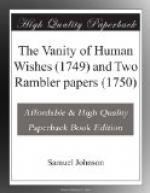The Spring affords to a Mind, so free from the Disturbance of Cares or Passions as to be vacant to calm Amusements, almost every Thing that our present State makes us capable of enjoying. The variegated Verdure of the Fields and Woods, the Succession of grateful Odours, the Voice of Pleasure pouring out its Notes on every Side, with the Observation of the Gladness apparently conceived by every Animal, from the Growth of his Food, and the Clemency of the Weather, throw over the whole Earth an Air of Gayety, which is very significantly expressed by the Smile of Nature.
There are Men to whom these Scenes are able to give no Delight, and who hurry away from all the Varieties of rural Beauty, to lose their Hours, and divert their Thoughts by Cards, or publick Assemblies, a Tavern Dinner, or the Prattle of the Day.
It may be laid down as a Position which will seldom deceive, that when a Man cannot bear his own Company there is something wrong. He must fly from himself, either because he feels a Tediousness in Life from the Equipoise of an empty Mind, which, having no Tendency to one Motion more than another but as it is impelled by some external Power, must always have recourse to foreign Objects; or he must be afraid of the Intrusion of some unpleasing Ideas, and, perhaps, is always struggling to escape from the Remembrance of a Loss, the Fear of a Calamity, or some other Thought of greater Horror.
Those, who are incapacitated to enjoy the Pleasures of Contemplation, by their Griefs, may, very properly, apply to such Diversions, provided they are innocent, as lay strong hold on the Attention; and those, whom Fear of any future Calamity chains down to Misery, must endeavour to obviate the Danger.
My Considerations shall, on this Occasion, be turned on such as are burthensome to themselves merely because they want Subjects for Reflection, and to whom the Volume of Nature is thrown open without affording them Pleasure or Instruction, because they never learned to read the Characters.
A French Author has advanced this seeming Paradox, that very few Men know how to take a Walk; and, indeed, it is very true, that few Men know how to take a Walk with a Prospect of any other Pleasure, than the same Company would have afforded them in any other Circumstances.
There are Animals that borrow their Colour from the neighbouring Body, and, consequently, vary their Hue as they happen to change their Place. In like manner it ought to be the Endeavour of every Man to derive his Reflexions from the Objects about him; for it is to no purpose that he alters his Position, if his Attention continues fixt to the same Point. The Mind should be kept open to the Access of every new Idea, and so far disengaged from the Predominance of particular Thoughts, as to be able to accommodate itself to emergent Occasions, and remark every Thing that offers itself to present Examination.




